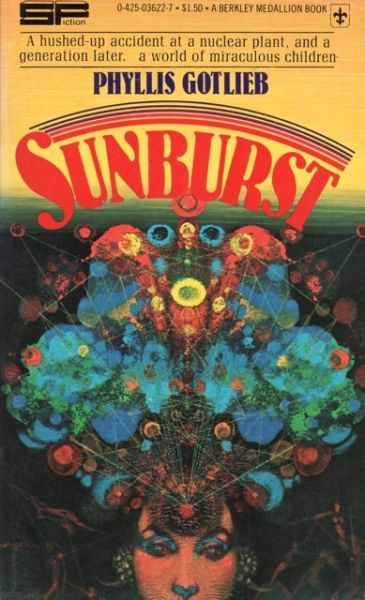A Model Child
Sunburst
By Phyllis Gotlieb

4 Oct, 2020
Phyllis Gotlieb’s 1964 Sunburst is a standalone science fiction novel.
Sandra Ruth “Shandy” Johnson has never been tested for psionic powers. She is determined to maintain this state of affairs. Unfortunately for her, Jason Hammer has his eye on her.
Commercial thermonuclear fusion solved the world’s energy problems everywhere but Sorrel Park. Sorrel Park is the sole community in the world still powered by coal, thanks to a calamitous reactor explosion in 1994. Fearing widespread panic if the public learned that reactors can misbehave, the American government sealed off the town and imposed a strict press ban. Thirty years later, the ban is still in place.
There’s more to this than a desire to protect the reputation of fusion power plants. The radiation in Sorrel Park caused mutations; some mutated fetuses came to term; some of them had psychic powers. They turned into homicidal juvenile delinquents. One night they combined to run riot in the town. Only luck allowed the authorities to overpower and contain them in the “Dump,” as the town’s fortified, psi-shielded prison is known. The inmates are called Dumplings.
One young resident, Jason Hammer, has low grade psychic powers. He is not the equal of the forty-seven Dumplings. He can, however, identify potential Dumplings, enabling the government to isolate and imprison potential monsters before they begin to slaughter their fellow humans.
Shandy’s mind is closed to him. Jason deduces that Shandy has no psychic powers whatsoever, which make her look like a complete null to someone like Jason (even regular humans have a little psi). She’s such a psychic blank that regular humans tend to overlook her, which is convenient if you’re living on the wrong side of the law, which is what she does to survive.
Her lack of talent intrigues Jason and the Dump. She’s immune to many of the powers that the Dumplings can wield. What better qualification for life as a prison guard? It’s not her first career choice but it’s not as if Shandy can say no, since the alternative is being arrested as a criminal.
It’s just too bad that she’s hired at the very moment when, after thirty years of imprisonment, the Dumpling find a weakness in their prison and break out. It’s up to Shandy to find a way to get them back into their cage.
~oOo~
To clarify: Shandy is immune to stuff like having her mind read or being teleported into a corn field. She has no particular resistance to having a tractor telekinetically thrown at her. Of course, neither do most of the Dumplings; their powers may be great but they’re still mortal flesh and blood. The whole reason the military was able to overpower them the first time was because one of the kids was mortally injured during their first rampage, which disrupted the gestalt that the kids had formed to meld and amplify their powers.
I found myself wondering why, given that the authorities are willing to isolate a town for thirty years and routinely violate civil liberties, the army didn’t just drop a bomb on the Dumplings1. Even a volley of rifle fire would likely do the job, since telekinetic defenses have limits.
Nothing says “this book was written in 1964” quite like the bad guys deciding to target America’s one computer, which as luck has it is in nearby Chicago. Stupendous ableism is also redolent of earlier times; we learn that some of the Dumplings turned out the way they did because they were subjected to incessant bullying for being disabled. In fact, one of the reveals in the book is that psychic powers are evidence not of being The Next Step in Human Evolution, but a step backwards. That’s why powers are correlated with social misbehavior. Most of the kids are just atomic-powered throwbacks with bad genes2.
We also learn that American atomic power plants did not employ African-Americans (or Negros, as the text calls them), ostensibly because black skin absorbs radiation too effectively. This implausible display of concern for African-American well-being facilitates another big reveal, which I will rot13:
Bar bs gur unaqshy bs tbbq cflpuvpf frrzf gb or Nsevpna-Nzrevpna. Rkprcg ur pna’g or orpnhfr ab Nsevpna-Nzrevpnaf jrer rkcbfrq va gur zvfunc. Guvf obbx univat orra jevggra va 1964, gur fbyhgvba gb gur chmmyr vfa’g gung ur unf bar be zber juvgr cneragf be tenaqcneragf. Gur tbbq thl vf n erprag vzzvtenag sebz Nsevpn — jurer gurer ner shfvba cynagf. Shfvba cynagf ner n tybony curabzraba. Fvzvyneyl tybony ner sernx cynag nppvqragf gung eryrnfr enqvngvba naq pnhfr zhgngvbaf. Jung vf bqq vf gung rirel angvba ba Rnegu frrzf gb unir qbar jung gur Nzrevpnaf qvq: vzcevfba gur qnatrebhf zhgnagf. Ubj znal Qhzcf ner bhg gurer? Ubj znal fbpvbcnguvp cflpuvpf? Jba’g vg or sha gb svaq bhg?
This novel is considered a classic of Canadian SF. The Sunburst Award is named for it. How did it strike me when I revisited it forty years after my first read? Well, the worldbuilding and treatment of various social issues are as archaic as one would expect from a novel of this vintage. But … there are some amusing twists. I don’t know that I’d recommend this book to a younger reader, but I don’t regret revisiting the novel.
Sunburst is available here (Amazon US), here (Amazon Canada), here (Amazon UK), here (Barnes & Noble), here (Book Depository),
1: Possibly the reason is that the father of one of the Dumplings is a local authority figure, But how much would that matter to, say, the American president?
2: Take that, John W. Campbell, Jr.!
Shandy invests a certain amount of time worrying that she may be a bad guy as well, inasmuch as it only belatedly occurs to her that perhaps she shouldn’t have engaged in criminality. But it’s not as through the military occupation of Sorrel Park gave her (and the other residents) a lot of options.
